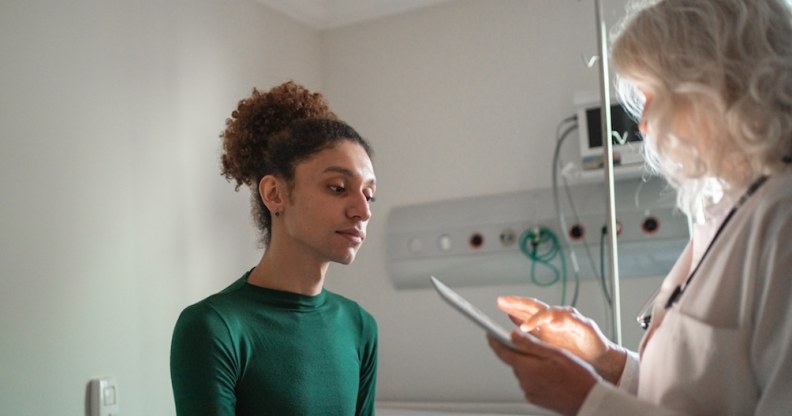NHS failing trans patients across the board – not just in gender-affirming care, report finds

70 per cent of trans people have experienced transphobia from their primary care provider. (Getty/ FG Trade)
The NHS is making it more difficult for GPs and other doctors to care for trans patients, a new report says.
While it is well-known that trans folk can spend many years on waiting lists to access gender-affirmative healthcare, the barriers faced in all other areas of healthcare are often overlooked.
These are the findings of a new report by the London Assembly Health Committee. The main barriers identified by the committee were a lack of awareness and education among NHS healthcare professionals, and an almost complete lack of data identification for trans folk in NHS services.
Speaking to the committee, Dr Kamilla Kamaruddin, a GP at the Tavistock and Portman NHS Trust’s Gender Identity Clinic, said: “I have tried very hard to introduce transgender monitoring in general practice, but it is the system that is failing us.”
She explained that GPs use “read codes” to identify information about a patient, for example if they are diabetic. But there is no read code to identify trans patients.
“It is very difficult for a GP to provide person-centred care for the patient,” said Kamaruddin.
“If a patient rings up, we have no knowledge of whether the patient is trans or not.”

(The Gender Spectrum Collection)
The committee’s report cited research from TransActual’s Trans Lives Survey 2021 which found that 70 per cent of trans people had experienced transphobia from their primary care provider, and that 14 per cent reported being refused care by their GP because they were trans.
This has a “worrying impact”, the report said, because “57 per cent of transgender people had put off seeing, or chosen not to see, their GP if they were ill”.
The TransActual findings were “backed up by this investigation, which heard examples of microaggressions, misgendering and using incorrect pronouns within the NHS,” the health committee added.
Without data, trans people are ‘invisible’
The London Assembly Health Committee called for extensive reform of NHS IT systems and data collection to “record trans status in a consistent and inclusive way”.
As Michelle Ross, founder of CliniQ, said in the evidence session: “Without data you are invisible.”
This invisibility creates a whole host of problems, from trans and non-binary people not being called for vital breast and cervical screenings, to patients being misgendered and mispronouned in hospital, causing significant distress.
It also means that services specific to the trans community are blocked.
Dr Alison May Berner, specialist registrar at the Tavistock’s Gender Identity Clinic, told the committee: “Time and time again I come up with a great idea and then am told, ‘No one is ever going to fund it, because you do not have any pilot data, nobody knows what your denominator number is and you do not know where people are’… I cannot tell them what the demand for that service would be because I cannot put a number on it because it is not monitored.”
Most NHS staff want to properly support trans patients, they just don’t know how
A lack of education and awareness among NHS professionals was also a serious problem, the report found.
Training on LGBT+ health inequalities and trans healthcare issues is not mandatory for NHS professionals, and there is no requirement for these issues to be included in medical schools’ curricula. This desperately needs to change, the Health Committee said.
Dr Kamaruddin said: “In my knowledge and my experience, most GPs or the majority of GPs want to help trans people but sometimes they do not know how to help them. That is the main barrier.”
Dr Berner added: “We did a survey of oncologists and this was in a broader category. This was just saying: ‘How confident are you in the specific needs of LGBTQ patients with cancer?’
Only eight per cent said that they felt confident. There is no other group where it would feel appropriate that eight per cent of your clinicians felt confident in managing a healthcare issue, or even knowing what that healthcare issue was.”
Education is also vital for non-clinical staff, for example to help GP surgeries update their websites, display posters and leaflets to show they are inclusive of trans patients.

(Envato)
The LGBT Foundation’s Pride in Practice Patient Survey 2018 found that trans patients were 21 per cent more likely to disclose their trans status to healthcare services when they were in a visibly inclusive environment.
The London Assembly Health Committee reviews public health and wellbeing issues for Londoners and monitors the Mayor of London’s inequalities strategy.
The report called for Sadiq Khan to conduct research into the healthcare needs of trans Londoners, and to set up “a consultative group comprised of Londoners with lived experience and subject experts” to examine inequalities in NHS healthcare for trans people.
This consultative group should work with the London Health Board to commission trans-inclusive training programmes for primary care services across London and work with NHS trusts and GP practices to create inclusive healthcare environments.
Once all of its aforementioned recommendations have been put in place, the committee said, the Office for Health Improvement and Disparities “should fund an awareness campaign to explain how to disclose trans and gender-diverse status to healthcare providers and the benefits of doing so”.
PinkNews contacted NHS Digital for comment.

